can 和 could 用法异同
情态动词can和could 用法详解

情态动词can和could用法详解can和could用法详解1.表示能力,could是can的过去。
如:Can you speak English?你会说英语吗?Could you speak English then?那时候你会说英语吗?2.表示xx,注意以下用法:(1)对于现在或将来的“许可”,要区分以下两种情况:a.表示请求允许(即请求别人允许自己做某事),可用can(=may)或could(=might)(注意:这里的could并不表示过去,而是表示现在,只是语气较委婉)。
如:b.表示给予允许(即自己允许别人做某事),一般只用can(=may),而不能用could或might。
如:A:Could [Can] I use your pen?我可以借用你的钢笔吗?B:Yes, of course you can.当然可以。
(注意:此处不用Yes,you could)(2)对于过去的“许可”,也要区分以下两种情况:a.表示过去一般性允许(即表示某人随时都可以做某事),用can的过去式(即could)。
如:When I lived at home, I could watch TV whenever I wantedto.我住在家里时,想什么时候看电影就可以什么时候看(一般性允许)。
b.表示过去特定的允许(即表示在过去某一特定情况下允许进行某一活动),则不用could,而需换成其它表达(如:had permission或was [were] allowed to)。
如:I was allowed to see the film yesterday evening.昨天晚上允许我去看了电影(特定的允许,所以不能用could)。
3.表示推测:(1)对现在或将来的推测,can通常只用于否定句或疑问句中,一般不用于肯定句:It can’t be true.那不可能是真的。
What can they be doing?他们会在干什么呢?Can it be Jim?那会是吉姆吗?但could(可以表示现在)则可用于肯定句中:We could [may, might] go to Guilin this summer.今年夏天我们可能要去桂林。
情态动词can和could用法详解
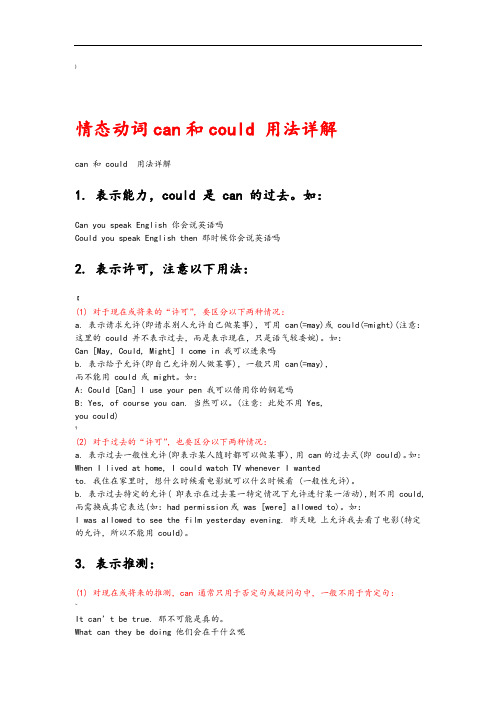
)情态动词can和could 用法详解can 和 could 用法详解1. 表示能力,could 是 can 的过去。
如:Can you speak English 你会说英语吗Could you speak English then 那时候你会说英语吗2. 表示许可,注意以下用法:【(1) 对于现在或将来的“许可”,要区分以下两种情况:a. 表示请求允许(即请求别人允许自己做某事),可用 can(=may)或 could(=might)(注意:这里的 could 并不表示过去,而是表示现在,只是语气较委婉)。
如:Can [May, Could, Might] I come in 我可以进来吗b. 表示给予允许(即自己允许别人做某事),一般只用 can(=may),而不能用 could 或 might。
如:A: Could [Can] I use your pen 我可以借用你的钢笔吗B: Yes, of course you can. 当然可以。
(注意: 此处不用 Yes,you could)?(2) 对于过去的“许可”,也要区分以下两种情况:a. 表示过去一般性允许(即表示某人随时都可以做某事),用 can的过去式(即 could)。
如:When I lived at home, I could watch TV whenever I wantedto. 我住在家里时,想什么时候看电影就可以什么时候看 (一般性允许)。
b. 表示过去特定的允许( 即表示在过去某一特定情况下允许进行某一活动),则不用 could, 而需换成其它表达(如:had permission或 was [were] allowed to)。
如:I was allowed to see the film yesterday evening. 昨天晚上允许我去看了电影(特定的允许,所以不能用 could)。
3. 表示推测:(1) 对现在或将来的推测,can 通常只用于否定句或疑问句中,一般不用于肯定句:~It can’t be true. 那不可能是真的。
can could would 的区别

can could would 的区别摘要:一、can和could的区别1.用法差异2.语气的不同3.表达能力的差异4.举例说明二、would的用法1.表示将来的推测2.表示意愿或倾向3.表示虚拟语气4.举例说明正文:在日常英语交流中,can、could和would这三个词的用法经常被混淆。
接下来,我们将详细解析这三个词的区别,帮助你更准确地运用它们。
首先,我们来了解can和could的区别。
1.用法差异Can表示能力、许可或可能性。
例如:- He can swim faster than me.(他比我游泳游得快。
)- Can I have a glass of water, please?(我能喝一杯水吗?)Could则表示过去的能力、许可或可能性,以及礼貌地提出请求。
例如:- When I was younger, I could swim faster than you.(当我年轻的时候,我比你游得快。
)- Could I have a glass of water, please?(我能要一杯水吗?)2.语气的不同Could的语气更加客气、委婉,而can则较为直接。
例如:- Can you pass me the salt, please?(你能递给我盐吗?)- Could you possibly pass me the salt, please?(你能尽量递给我盐吗?)3.表达能力的差异Can用于现在时态,表示现在的能力或状况;而could则用于过去时态,表示过去的能力。
4.举例说明假设小明现在会游泳,我们可以说他can swim,表示他现在具有这个能力。
而如果我们要表达小明小时候就会游泳,我们可以说he could swim when he was younger,表示他过去有能力游泳。
接下来,我们来了解would的用法。
1.表示将来的推测Would用于表示根据目前的情况,对将来可能发生的事情进行推测。
情态动词can和could 用法详解
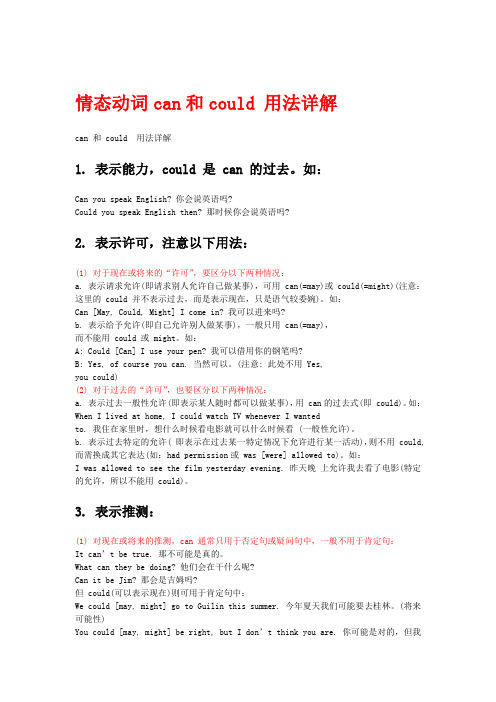
情态动词can和could 用法详解can 和 could 用法详解1. 表示能力,could 是 can 的过去。
如:Can you speak English? 你会说英语吗?Could you speak English then? 那时候你会说英语吗?2. 表示许可,注意以下用法:(1) 对于现在或将来的“许可”,要区分以下两种情况:a. 表示请求允许(即请求别人允许自己做某事),可用 can(=may)或 could(=might)(注意:这里的 could 并不表示过去,而是表示现在,只是语气较委婉)。
如:Can [May, Could, Might] I come in? 我可以进来吗?b. 表示给予允许(即自己允许别人做某事),一般只用 can(=may),而不能用 could 或 might。
如:A: Could [Can] I use your pen? 我可以借用你的钢笔吗?B: Yes, of course you can. 当然可以。
(注意: 此处不用 Yes,you could)(2) 对于过去的“许可”,也要区分以下两种情况:a. 表示过去一般性允许(即表示某人随时都可以做某事),用 can的过去式(即 could)。
如:When I lived at home, I could watch TV whenever I wantedto. 我住在家里时,想什么时候看电影就可以什么时候看 (一般性允许)。
b. 表示过去特定的允许( 即表示在过去某一特定情况下允许进行某一活动),则不用 could, 而需换成其它表达(如:had permission或 was [were] allowed to)。
如:I was allowed to see the film yesterday evening. 昨天晚上允许我去看了电影(特定的允许,所以不能用 could)。
3. 表示推测:(1) 对现在或将来的推测,can 通常只用于否定句或疑问句中,一般不用于肯定句:It can’t be true. 那不可能是真的。
can与could的用法详解
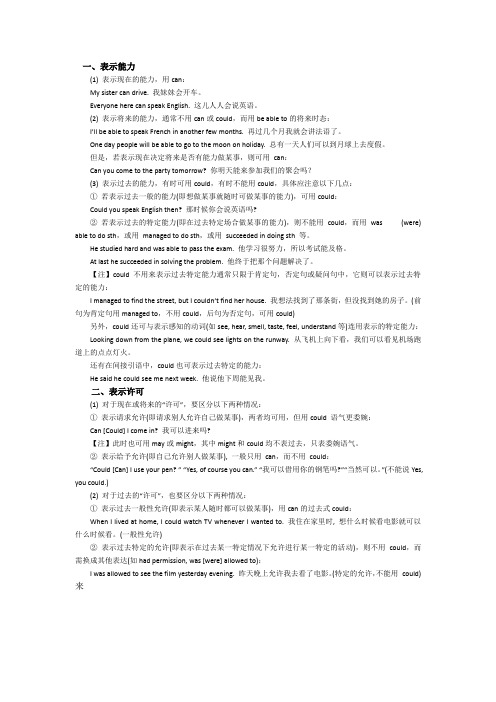
一、表示能力(1) 表示现在的能力,用can:My sister can drive. 我妹妹会开车。
Everyone here can speak English. 这儿人人会说英语。
(2) 表示将来的能力,通常不用can或could,而用be able to的将来时态:I’ll be able to speak French in another few months. 再过几个月我就会讲法语了。
One day people will be able to go to the moon on holiday. 总有一天人们可以到月球上去度假。
但是,若表示现在决定将来是否有能力做某事,则可用can:Can you come to the party tomorrow? 你明天能来参加我们的聚会吗?(3) 表示过去的能力,有时可用could,有时不能用could,具体应注意以下几点:①若表示过去一般的能力(即想做某事就随时可做某事的能力),可用could:Could you speak English then? 那时候你会说英语吗?②若表示过去的特定能力(即在过去特定场合做某事的能力),则不能用could,而用was (were) able to do sth,或用managed to do sth,或用succeeded in doing sth 等。
He studied hard and was able to pass the exam. 他学习很努力,所以考试能及格。
At last he succeeded in solving the problem. 他终于把那个问题解决了。
【注】could 不用来表示过去特定能力通常只限于肯定句,否定句或疑问句中,它则可以表示过去特定的能力:I managed to find the street, but I couldn’t find her house. 我想法找到了那条街,但没找到她的房子。
Can和could的用法和区别
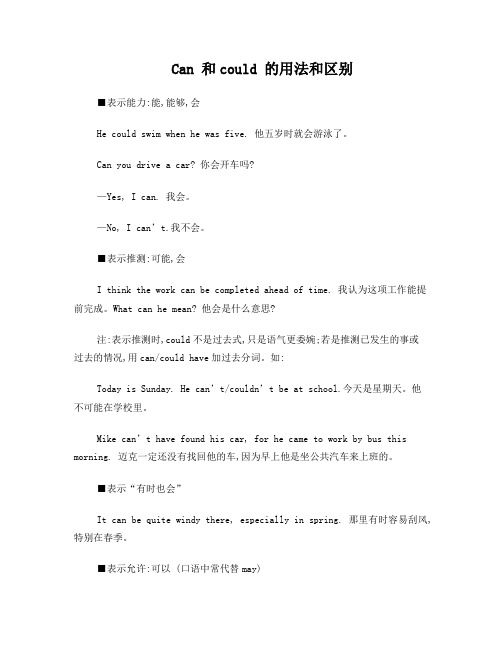
Can 和could 的用法和区别■表示能力:能,能够,会He could swim when he was five. 他五岁时就会游泳了。
Can you drive a car? 你会开车吗?—Yes, I can. 我会。
—No, I can’t.我不会。
■表示推测:可能,会I think the work can be completed ahead of time. 我认为这项工作能提前完成。
What can he mean? 他会是什么意思?注:表示推测时,could不是过去式,只是语气更委婉;若是推测已发生的事或过去的情况,用can/could have加过去分词。
如:Today is Sunday. He can’t/couldn’t be at school.今天是星期天。
他不可能在学校里。
Mike can’t have found his car, for he came to work by bus this morning. 迈克一定还没有找回他的车,因为早上他是坐公共汽车来上班的。
■表示“有时也会”It can be quite windy there, especially in spring. 那里有时容易刮风, 特别在春季。
■表示允许:可以 (口语中常代替may)You can first lend me one book this time. 这次你可以先借给我一本书。
You ca n’t take the book out of the room.你不可以将这本书拿出室外。
注意:1. 表示允许别人做某事只能用can,不能用could。
2.can’t和mustn’t一样,都可表示“不准,不允许”。
■表示请求:可以Can I go swimming today, please, mum? 妈妈,我今天可以去游泳吗?Could you tell me how I can get to the railway station? 请告诉我去火车站怎么走吗?注意:could不是过去式,只是语气较can更委婉,注意在回答中不可用could。
情态动词can和could用法详解
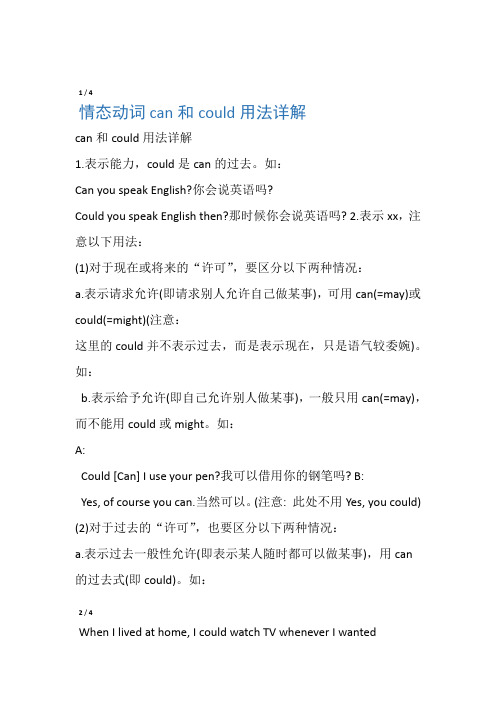
1 / 4情态动词can和could用法详解can和could用法详解1.表示能力,could是can的过去。
如:Can you speak English?你会说英语吗?Could you speak English then?那时候你会说英语吗? 2.表示xx,注意以下用法:(1)对于现在或将来的“许可”,要区分以下两种情况:a.表示请求允许(即请求别人允许自己做某事),可用can(=may)或could(=might)(注意:这里的could并不表示过去,而是表示现在,只是语气较委婉)。
如:b.表示给予允许(即自己允许别人做某事),一般只用can(=may),而不能用could或might。
如:A:Could [Can] I use your pen?我可以借用你的钢笔吗? B:Yes, of course you can.当然可以。
(注意: 此处不用Yes, you could)(2)对于过去的“许可”,也要区分以下两种情况:a.表示过去一般性允许(即表示某人随时都可以做某事),用can的过去式(即could)。
如:2 / 4When I lived at home, I could watch TV whenever I wantedto.我住在家里时,想什么时候看电影就可以什么时候看(一般性允许)。
b.表示过去特定的允许(即表示在过去某一特定情况下允许进行某一活动),则不用could,而需换成其它表达(如:had permission或was [were] allowed to)。
如:I was allowed to see the film yesterday evening.昨天晚上允许我去看了电影(特定的允许,所以不能用could)。
3.表示推测:(1)对现在或将来的推测,can通常只用于否定句或疑问句中,一般不用于肯定句:It can't be true.那不可能是真的。
Can_could的用法
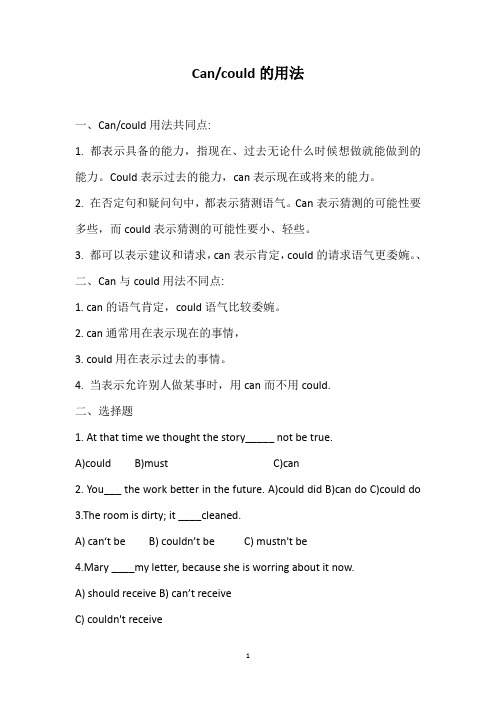
Can/could的用法一、Can/could用法共同点:1. 都表示具备的能力,指现在、过去无论什么时候想做就能做到的能力。
Could表示过去的能力,can表示现在或将来的能力。
2. 在否定句和疑问句中,都表示猜测语气。
Can表示猜测的可能性要多些,而could表示猜测的可能性要小、轻些。
3. 都可以表示建议和请求,can表示肯定,could的请求语气更委婉。
、二、Can与could用法不同点:1. can的语气肯定,could语气比较委婉。
2. can通常用在表示现在的事情,3. could用在表示过去的事情。
4. 当表示允许别人做某事时,用can而不用could.二、选择题1. At that time we thought the story_____ not be true.A)could B)must C)can2. You___ the work better in the future. A)could did B)can do C)could do3.The room is dirty; it ____cleaned.A) can‘t be B) couldn’t be C) mustn't be4.Mary ____my letter, because she is worring about it now.A) should receive B) can’t receiveC) couldn't receive5.An Englishman who ____not speak Chinese in China.A) must B) could C) can6.Mr Wang ______ write last year, he was ill for three years.A. mustn’tB. couldn’tC. can’t7. –Who is the man over there? Is it Mr Li?--No, it ______ be him. Mr Li is much taller.A. mustn’tB. could notC. can’t8.Could I seat here?Yes, of course you _______.A. CanB.couldC.must。
can 和 could 用法详解
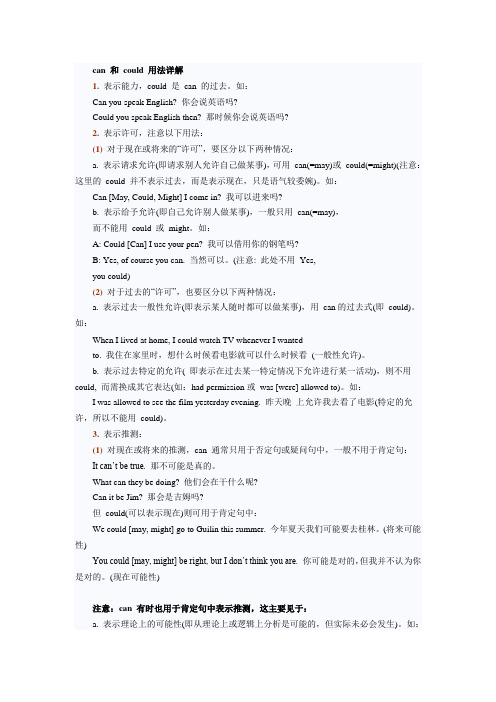
can 和could 用法详解1.表示能力,could 是can 的过去。
如:Can you speak English? 你会说英语吗?Could you speak English then? 那时候你会说英语吗?2.表示许可,注意以下用法:(1) 对于现在或将来的“许可”,要区分以下两种情况:a. 表示请求允许(即请求别人允许自己做某事),可用can(=may)或could(=might)(注意:这里的could 并不表示过去,而是表示现在,只是语气较委婉)。
如:Can [May, Could, Might] I come in? 我可以进来吗?b. 表示给予允许(即自己允许别人做某事),一般只用can(=may),而不能用could 或might。
如:A: Could [Can] I use your pen? 我可以借用你的钢笔吗?B: Yes, of course you can.当然可以。
(注意: 此处不用Yes,you could)(2) 对于过去的“许可”,也要区分以下两种情况:a. 表示过去一般性允许(即表示某人随时都可以做某事),用can的过去式(即could)。
如:When I lived at home, I could watch TV whenever I wantedto. 我住在家里时,想什么时候看电影就可以什么时候看(一般性允许)。
b. 表示过去特定的允许( 即表示在过去某一特定情况下允许进行某一活动),则不用could, 而需换成其它表达(如:had permission或was [were] allowed to)。
如:I was allowed to see the film yesterday evening. 昨天晚上允许我去看了电影(特定的允许,所以不能用could)。
3.表示推测:(1) 对现在或将来的推测,can 通常只用于否定句或疑问句中,一般不用于肯定句:It can’t be true. 那不可能是真的。
can和could表推测的用法
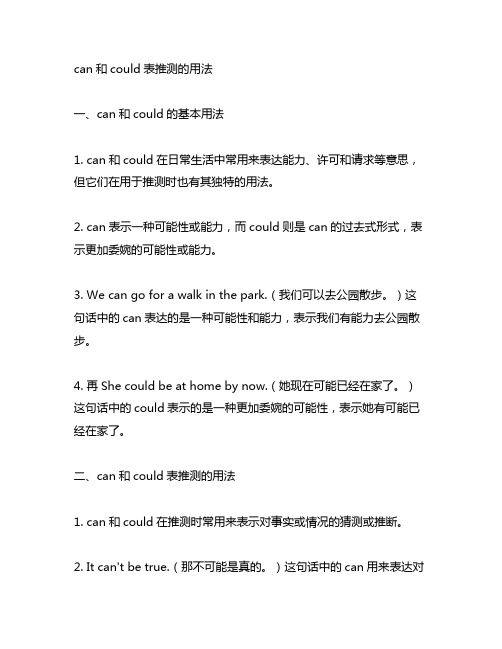
can和could表推测的用法一、can和could的基本用法1. can和could在日常生活中常用来表达能力、许可和请求等意思,但它们在用于推测时也有其独特的用法。
2. can表示一种可能性或能力,而could则是can的过去式形式,表示更加委婉的可能性或能力。
3. We can go for a walk in the park.(我们可以去公园散步。
)这句话中的can表达的是一种可能性和能力,表示我们有能力去公园散步。
4. 再She could be at home by now.(她现在可能已经在家了。
)这句话中的could表示的是一种更加委婉的可能性,表示她有可能已经在家了。
二、can和could表推测的用法1. can和could在推测时常用来表示对事实或情况的猜测或推断。
2. It can't be true.(那不可能是真的。
)这句话中的can用来表达对某事情不可能性的推测。
3. 再She could have missed the tr本人n.(她可能错过了火车。
)这句话中的could表达了对她错过火车的推测。
4. can和could还可以用来表达对过去事件的推测,He could have taken the wrong turn.(他可能走错了路。
)5. can和could还可以用来表示对将来可能发生的事情的推测,It could r本人n tomorrow.(明天可能会下雨。
)三、can和could的注意事项1. 在一般现在时和一般将来时中,can和could用来表示推测时,其否定形式为can't和couldn't。
2. She can't be at home now.(她现在不可能在家。
)这句话中的can't表示推测的否定形式。
3. 而在一般过去时中,could的否定形式为couldn't,He couldn't have finished the work so fast.(他不可能这么快就完成了工作。
can 和 could 用法异同

情态动词can 和could 异同对于情态动词can 和could,后者是前者的过去形式,但是却不见得总是表示过去,具体用法如下:1. 表示“能力”,相当于汉语的“能够、可以、得以”等意思,在这种情况下,can 用于现在时态,could 用于过去时态,如:1)表示现在:I can carry both suitcases.我可以搬动两个箱子。
Can you remember the war?你还能记得那场战争吗2)表示过去:We could see the oil bleeding out from the joint.(那时)我们可以看出油从接缝处渗出。
It was so dark that we could see nothing.(当时)天太暗了,我们什么也看不见。
2. could比较委婉客气地提出问题或陈述看法,这时could和can没有时间上的差别。
如:—Could you let me have your passport? —看看你的护照好吗?—Yes, here it is. —行,这就是。
I could come earlier, if necessary. 如果必要我可以早点来。
3. 表示“猜测”,相当于汉语的“有可能”,一般不分时态,具体区别如下1) 表示理论上的可能性(即从理论上分析是可能的,但实际未必会发生),可用can(表现在)或could(表过去):E.g. He is in poor health. He can be ill at any time. 他身体不好,随时都可能会生病。
Even experts can make mistakes. 即使是专家也可能会出差错。
My mother could be very unpleasant at times. 我母亲有时候会让人非常不愉快。
2) 表示现实可能性,这包含两个方面的含义:一是指将来可能性,一是指现在的可能性,在这两种用法中,通常都不用can,但可用could (可以指现在,相当于may / might):E.g. 今年夏天我们可能要去日本。
Can和could的用法和区别
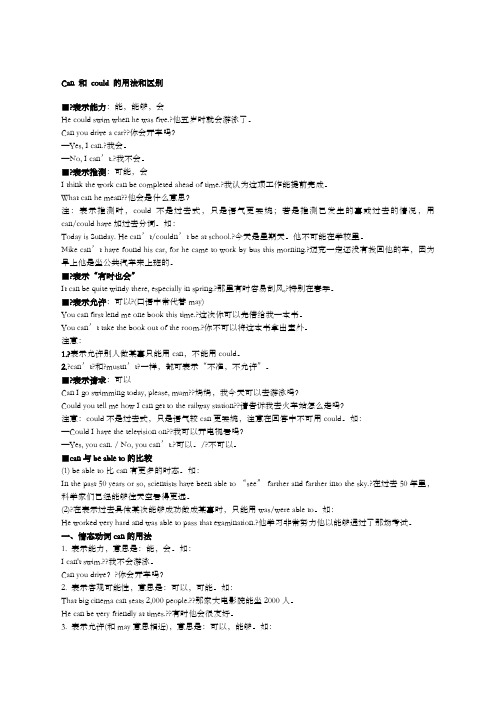
Can 和could 的用法和区别■?表示能力:能,能够,会He could swim when he was five.?他五岁时就会游泳了。
Can you drive a car??你会开车吗?—Yes, I can.?我会。
—No, I can’t.?我不会。
■?表示推测:可能,会I think the work can be completed ahead of time.?我认为这项工作能提前完成。
What can he mean??他会是什么意思?注:表示推测时,could不是过去式,只是语气更委婉;若是推测已发生的事或过去的情况,用can/could have加过去分词。
如:Today is Sunday. He can’t/couldn’t be at school.?今天是星期天。
他不可能在学校里。
Mike can’t have found his car, for he came to work by bus this morning.?迈克一定还没有找回他的车,因为早上他是坐公共汽车来上班的。
■?表示“有时也会”It can be quite windy there, especially in spring.?那里有时容易刮风,?特别在春季。
■?表示允许:可以?(口语中常代替may)You can first lend me one book this time.?这次你可以先借给我一本书。
You can’t take the book out of the room.?你不可以将这本书拿出室外。
注意:1.?表示允许别人做某事只能用can,不能用could。
2.?can’t?和?mustn’t?一样,都可表示“不准,不允许”。
■?表示请求:可以Can I go swimming today, please, mum??妈妈,我今天可以去游泳吗?Could you tell me how I can get to the railway station??请告诉我去火车站怎么走吗?注意:could不是过去式,只是语气较can更委婉,注意在回答中不可用could。
can与could的用法归纳
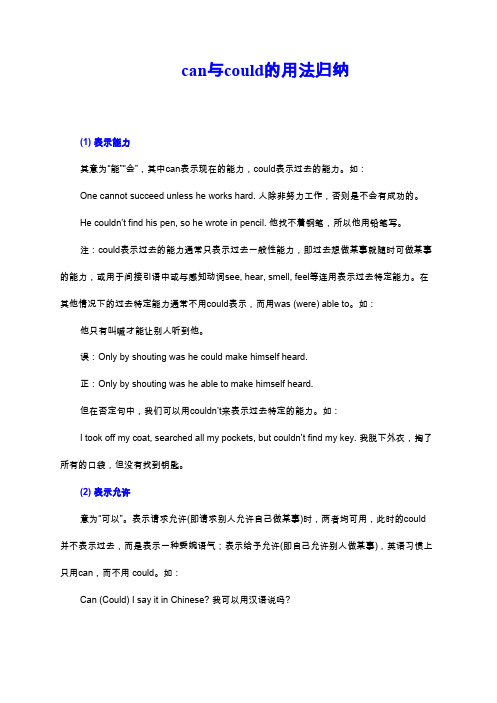
can与c ould的用法归纳(1) 表示能力其意为“能”“会”,其中can表示现在的能力,could表示过去的能力。
如:One cannot succeed unless he works hard. 人除非努力工作,否则是不会有成功的。
He couldn’t find his pen, so he wrote in pencil. 他找不着钢笔,所以他用铅笔写。
注:could表示过去的能力通常只表示过去一般性能力,即过去想做某事就随时可做某事的能力,或用于间接引语中或与感知动词see, hear, smell, feel等连用表示过去特定能力。
在其他情况下的过去特定能力通常不用could表示,而用was (were) able to。
如:他只有叫喊才能让别人听到他。
误:Only by shouting was he could make himself heard.正:Only by shouting was he able to make himself heard.但在否定句中,我们可以用couldn’t来表示过去特定的能力。
如:I took off my coat, searched all my pockets, but couldn’t find my key. 我脱下外衣,掏了所有的口袋,但没有找到钥匙。
(2) 表示允许意为“可以”。
表示请求允许(即请求别人允许自己做某事)时,两者均可用,此时的could 并不表示过去,而是表示一种委婉语气;表示给予允许(即自己允许别人做某事),英语习惯上只用can,而不用 could。
如:Can (Could) I say it in Chinese? 我可以用汉语说吗?“Can (Could) I borrow your umbrella?” “Yes, of course you can.” “我可以借用一下你的雨伞吗?”“当然可以。
”(不能说 Yes, you could.)注:以上说的是针对现在或将来情况而言的,若谈的是过去情况,则过去could只用于表示过去一般性允许(即表示某人随时都可以做某事),而不表示特定的允许(即表示在过去某一特定情况下允许进行某一特定的活动),遇此情况需换成其他表达。
英语中can和could的用法
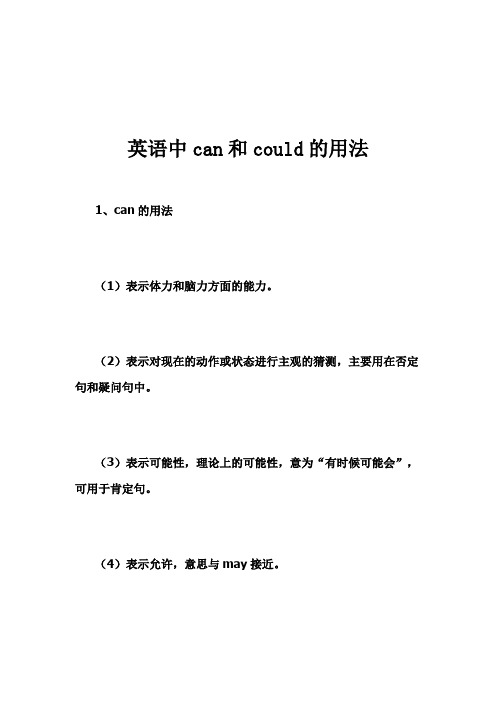
英语中can和could的用法
1、can的用法
(1)表示体力和脑力方面的能力。
(2)表示对现在的动作或状态进行主观的猜测,主要用在否定句和疑问句中。
(3)表示可能性,理论上的可能性,意为“有时候可能会”,可用于肯定句。
(4)表示允许,意思与may接近。
(5)表示说话人的推测、怀疑、惊异、猜测或不肯定等,主要用于否定句、疑问句或感叹句中。
(6)can的特殊句型
cannot…too / enough表示“无论怎么。
也不过分”。
“越。
越好”。
cannot but+ do sth.表示“不得不,只好”。
2、could的用法
(1)表示能力,指的是过去时间。
(2)表示允许,指的是过去时间。
(3)表示可能,可以指过去时间,也可以指现在时间,表示语气缓和。
(4)委婉客气地提出问题或陈述看法,指的是现在时间。
主要用于疑问句,回答时用can。
3、can与could的区别
can表推测时只用于否定句和疑问句(could无此限制)。
couldn't的可能性比can't小。
4、can与be able to的区别
(1)现在时:无区别,但后者不常用。
(2)完成时;can没有完成时,此时要用have(has,had)been able to。
(3)将来时:can没有将来时,要用will be able to。
(4)过去时:could表示一般能力,was/were able to 表示在具体场合通过努力成功做成某事的能力。
情态动词 can,could

情态动词 can/could 4个不同用法
2,语气不同,与时态无关: could语气更委婉 ➢ Can you help me? ➢ Could you help me? ➢ Can you open the door please? ➢ Could you open the door please?
B: No, I ______.
2. 按要求完成句子。 1. He can ride a bike. (改为一般疑问句和否定句,并作肯定和否定回答) 一般疑问句_________________________ 否定句____________________________ 肯定回答_______________ 否定回答__________________ 2.你会弹吉他吗? _______ you ________ _________ guitar? 3.两年前我不会骑自行。 I _______ _________ a bike two years ________ .
can/can't 与 could/couldn't
can could would的区别与用法

can could would的区别与用法"can"、"could"和"would"都是情态动词,用于表示能力、可能性、建议、请求和假设等意义。
下面是它们的具体区别和用法:1. can:- 表示能力,意味着某人具有做某事的能力。
- I can swim.(我会游泳。
)- 表示许可或允许,意味着某人有权利或被允许做某事。
- Can I use your phone?(我可以用你的手机吗?)- 表示可能性,意味着某事有可能发生。
- It can rain later.(后面可能下雨。
)- 表示推测或推断,意味着某事很可能是真实的。
- She can be at the party.(她可能在派对上。
)2. could:- 过去式和过去进行式的can,表示过去的能力、许可或可能性。
- When I was younger, I could run faster.(我年轻时跑得更快。
)- 表示一种委婉、客气或请求的方式。
- Could you please pass me the salt?(请你把盐递给我好吗?) - 表示建议、意愿或愿望,表达一种虚拟的情况。
- I wish I could go on vacation.(我希望我能去度假。
)3. would:- 表示愿意、意愿或乐意做某事。
- I would help you if I could.(如果有可能的话,我会帮助你。
)- 表示一种假设情况,用于虚拟语气。
- If I had more money, I would travel the world.(如果我有更多的钱,我会周游世界。
)- 用于客气地提出请求。
- Would you mind closing the window?(你介意关上窗户吗?)需要注意的是,这些情态动词还有其他用法和含义,具体用法要根据句子的语境来确定。
Can和Could用法_Can和Could的区别

Can和Could用法_Can和Could的区别Can和Could 都是情态动词。
一般情况下,Could比Can 更礼貌(或者更正式)一些。
接下来,店铺为你分享Can和Could用法,希望对你有帮助。
Can和Could的用法(一):canThe three main uses of Can are: 1) ability 2) possibility and 3) permission. However there are some other uses of Can as we will see below.1. To express abilityCan means to be (physically) able to do something OR to know how to do something.I can speak two languages.2. To express a possibility (in general)This refers to a theoretical possibility.Note: we don't use can to talk about future possibilities. For this you would use may or might.I know you can win the competition.3. To offer to do something for othersCan is used when you offer to help someone or to do something for them.You don't need to walk home. I can take you there if you like.4. To ask for or give permission / To request somethingCan is used to ask for / request permission or to give permission.Note: Can't is used to refuse permission.Can means to be (physically) able to do something OR to know how to do something.Mary, you can play outside if you like.5. Can't: Something that is forbidden or not allowedYou can drive as fast as you want on the German motorways. Can和Could的用法(二):couldCould is similar to Can and often replaces Can in the past tense (though not always)1. To express ability in the pastShe could juggle eight balls when she was only 10 years old.2. Polite word used to ask for permission or to request something (in the present)Could I please use your bathroom?3. General permission in the pastHe couldn't go to the concert because his mother wouldn't let him.4. Couldn't: Sure that something is untrueJust like can't, you can use couldn't when you are sure that something isn't true or real.He couldn't have painted that. He has no artistic ability at all.5.Could: A conditional form ofCanWould + Can = Could. Note: Would be able to can replace could in the following examples.I could write the letter if you told me what to include.。
英语重点词汇can和could用法辨析详解

英语重点词汇can和could用法辨析详解1、can的用法(1)表示体力和脑力方面的能力。
He can speak a little English now. 他现在能说一点英语。
(2)表示对现在的动作或状态进行主观的猜测,主要用在否定句和疑问句中。
(3)表示可能性,理论上的可能性,意为“有时候可能会”,可用于肯定句。
(4)表示允许,意思与may接近。
(5)表示说话人的推测、怀疑、惊异、猜测或不肯定等,主要用于否定句、疑问句或感叹句中。
I wonder if my long lost neighbor can/could still be alive.我怀疑我失踪已久的邻居是否还有可能活着。
Such things can/could and do happen.这样的事情可能而且确实发生了。
(6)can的特殊句型cannot…too / enough表示“无论怎么……也不过分”。
“越……越好”。
You cannot be too careful to cross the street. You cannot be careful enough to ross the street.过马路的时候,你怎么小心都不为过。
We cannot put too much emphasis on grammar when learning written English.学习书面英语时,我们再怎么强调语法也不为过。
(We can neverput toomuch emphasis on grammar when learning written English.)We cannot put enough emphasis on grammar when learning written English.学习书面英语时,我们再怎么强调语法也不为过。
I can hardly praise this film too highly.这部电影评价再高也不为过。
can和could的区别和用法
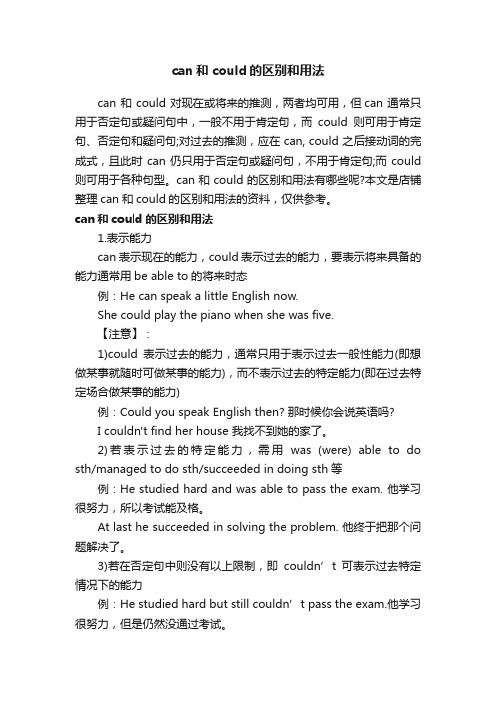
can和could的区别和用法can 和 could 对现在或将来的推测,两者均可用,但can 通常只用于否定句或疑问句中,一般不用于肯定句,而could则可用于肯定句、否定句和疑问句;对过去的推测,应在 can, could 之后接动词的完成式,且此时can仍只用于否定句或疑问句,不用于肯定句;而could 则可用于各种句型。
can和could的区别和用法有哪些呢?本文是店铺整理can和could的区别和用法的资料,仅供参考。
can和could的区别和用法1.表示能力can表示现在的能力,could表示过去的能力,要表示将来具备的能力通常用be able to的将来时态例:He can speak a little English now.She could play the piano when she was five.【注意】:1)could表示过去的能力,通常只用于表示过去一般性能力(即想做某事就随时可做某事的能力),而不表示过去的特定能力(即在过去特定场合做某事的能力)例:Could you speak English then? 那时候你会说英语吗?I couldn't find her house 我找不到她的家了。
2)若表示过去的特定能力,需用was (were) able to do sth/managed to do sth/succeeded in doing sth等例:He studied hard and was able to pass the exam. 他学习很努力,所以考试能及格。
At last he succeeded in solving the problem. 他终于把那个问题解决了。
3)若在否定句中则没有以上限制,即couldn’t可表示过去特定情况下的能力例:He studied hard but still couldn’t pass the exam.他学习很努力,但是仍然没通过考试。
- 1、下载文档前请自行甄别文档内容的完整性,平台不提供额外的编辑、内容补充、找答案等附加服务。
- 2、"仅部分预览"的文档,不可在线预览部分如存在完整性等问题,可反馈申请退款(可完整预览的文档不适用该条件!)。
- 3、如文档侵犯您的权益,请联系客服反馈,我们会尽快为您处理(人工客服工作时间:9:00-18:30)。
情态动词can 和could 异同
对于情态动词can 和could,后者是前者的过去形式,但是却不见得总是表示过去,具体用法如下:
1. 表示“能力”,相当于汉语的“能够、可以、得以”等意思,在这种情况下,can 用于现在时态,could 用于过去时态,如:
1)表示现在:
I can carry both suitcases.
我可以搬动两个箱子。
Can you remember the war?
你还能记得那场战争吗
2)表示过去:
We could see the oil bleeding out from the joint.
(那时)我们可以看出油从接缝处渗出。
It was so dark that we could see nothing.
(当时)天太暗了,我们什么也看不见。
2. could比较委婉客气地提出问题或陈述看法,这时could和can没有时间上的差别。
如:—Could you let me have your passport? —看看你的护照好吗?
—Yes, here it is. —行,这就是。
I could come earlier, if necessary. 如果必要我可以早点来。
3. 表示“猜测”,相当于汉语的“有可能”,一般不分时态,具体区别如下
1) 表示理论上的可能性(即从理论上分析是可能的,但实际未必会发生),可用can(表现在)
或could(表过去):
E.g. He is in poor health. He can be ill at any time. 他身体不好,随时都可能会生病。
Even experts can make mistakes. 即使是专家也可能会出差错。
My mother could be very unpleasant at times. 我母亲有时候会让人非常不愉快。
2) 表示现实可能性,这包含两个方面的含义:一是指将来可能性,一是指现在的可能性,在这两种用法中,通常都不用can,但可用could (可以指现在,相当于may / might):E.g. 今年夏天我们可能要去日本。
(将来可能性)
正:We could [may,might] go to Japan this summer.
误:We can go to Japan this summer.
你可能是对的,但我不认为你对。
(现在可能性)
正:You could [may,might] be right,but I don’t think you are.
误:You can be right,but I don’t think you are.
有时也用can来表示现在的可能性,但那通常只限于否定句或疑问句中:
E.g. It can’t be true. 那不可能是真的。
What can he possibly want? 他可能会想要什么呢?
3) 但是用于虚拟语气表示相反的假设时,只能用could,如:
E.g. If I could go with you, I should feel very glad.
假如我能同你们一起去,我会感到非常高兴。
You could have been more considerate. 你本来可以更慎重些。
